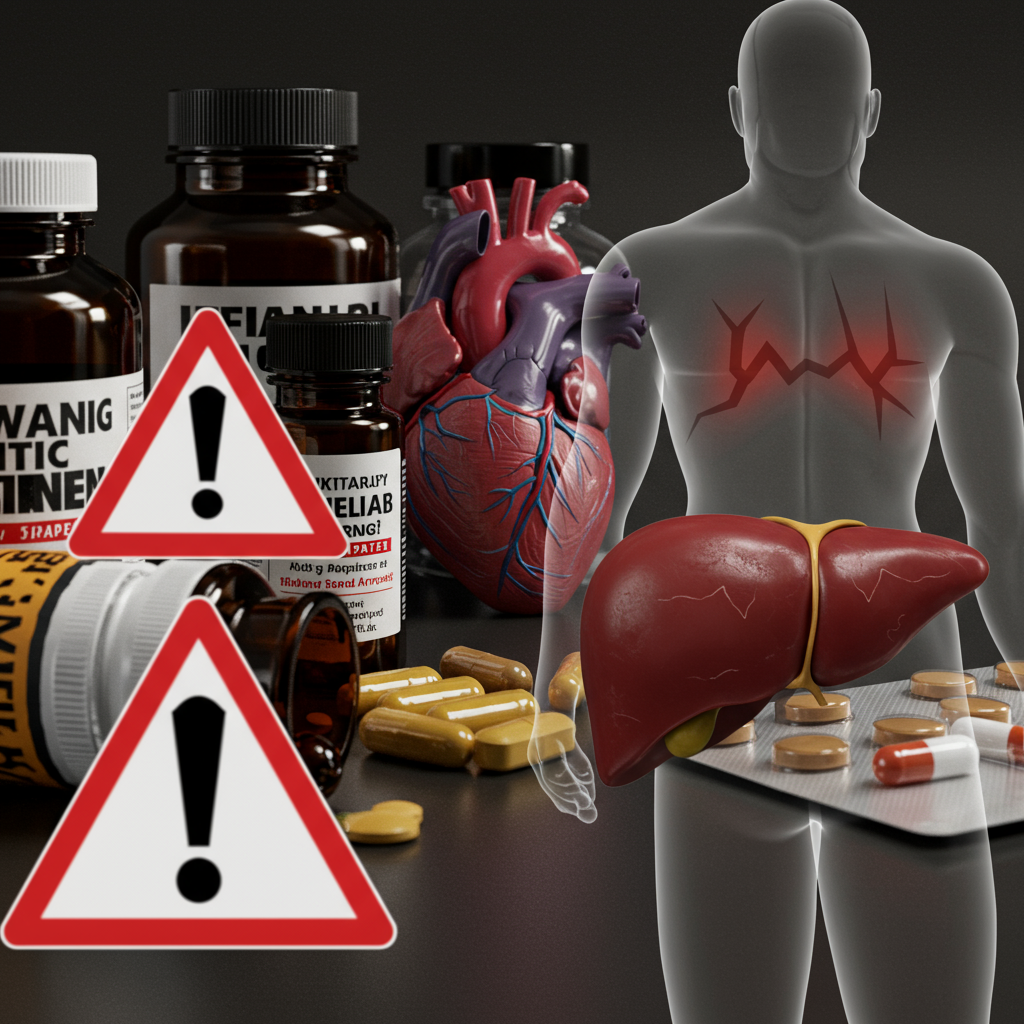Taking <a href="https://news.quantosei.com/2025/06/30/the-best-guide-to-heart-health-is-proactive-heart-health/” title=”Essential Guide to Proactive Heart Health & Prevention”>supplements feels like a proactive step for well-being. Millions reach for vitamins, herbs, and other capsules hoping to boost energy, improve immunity, or support organ health. Yet, a leading cardiologist warns that some popular supplements and even ingredients used in their packaging might harbor hidden dangers, potentially increasing the risk of serious conditions like heart attacks and liver failure. It’s crucial to understand these risks before adding anything new to your health regimen.
Dr. Evan Levine, a cardiologist at Mount Sinai in New York, highlights several common supplements and substances that could pose long-term health threats. He points out that while heart disease remains a major killer in the US, increasingly affecting younger adults, liver disease also impacts millions annually. His warning serves as a vital reminder: perceived wellness aids aren’t always harmless, especially if misused or taken in high doses.
Surprising Culprits: Supplements Linked to Heart & Liver Issues
Dr. Levine specifically cautioned against five common substances. While some are well-known nutrients, others are less obvious components of supplements. Understanding the potential dangers helps consumers make informed decisions.
Niacin (Vitamin B3): A Double-Edged Sword
Niacin, or Vitamin B3, is essential. It plays a role in energy metabolism, nerve function, and digestive health. You get it naturally from foods like meat, fish, nuts, and bananas. Sometimes, doctors prescribe niacin supplements, often in high doses, to manage high cholesterol or ease arthritis symptoms.
However, taking too much niacin can be risky. Dr. Levine notes that high doses can cause inflammation. This inflammation may damage blood cells and blood vessels. A concerning 2024 study published in Nature Medicine found that consuming niacin supplements could double the risk of cardiovascular diseases. Researchers linked high niacin intake to plaque buildup in arteries. This plaque can restrict blood flow and harm blood vessels over time.
The recommended daily intake for adults is modest, typically 14–18 mg. Dr. Levine warns that doses between 2,000 and 6,000 milligrams per day can seriously damage the heart. Beyond heart issues, excess Vitamin B3 is also toxic to the liver. It can lead to hepatitis and potentially liver failure. Symptoms of too much niacin vary widely. Mild signs include dry skin or hair loss. More severe effects include liver damage, bone problems, or even birth defects if taken by pregnant women.
Green Tea Extract: Concentrated Risk
Green tea is celebrated globally for its health benefits. It’s packed with antioxidants that support heart, liver, and brain health. The beverage itself is generally considered safe. However, its concentrated form – green tea extract – is another story.
Supplement capsules of green tea extract can contain the same amount of active compounds as many cups of tea. While beneficial in moderation, high doses of the extract can overwhelm the liver. Dr. Levine warns that excessive green tea extract can be toxic to liver tissue, causing hepatocellular injury. This damage ranges from minor changes in liver enzymes to severe cases potentially requiring a liver transplant.
The potent antioxidants, particularly EGCG (epigallocatechin gallate), can saturate and harm the liver when consumed in excessive supplement quantities. While healthy individuals may tolerate moderate doses, risks are higher for those with pre-existing conditions. This includes individuals with anemia, bleeding disorders, heart problems, diabetes, glaucoma, or past liver issues. The European Food Safety Authority (EFSA) suggests daily doses at or above 800mg of green tea extract could be dangerous, especially for people taking blood thinners or certain heart medications. This highlights the potential for interactions and increased risk in vulnerable populations.
Erythritol and Xylitol: Sweeteners with a Sour Side
These zero-calorie sweeteners are popular alternatives to sugar. They are common in “keto-friendly” products, sugar-free snacks, gum, mouthwash, and toothpaste. Both erythritol and xylitol are FDA-approved as food additives and can help manage blood sugar for diabetics. They also benefit oral health by preventing cavities.
However, despite their approval and benefits, these additives may increase cardiovascular risk. Dr. Levine explains that erythritol and xylitol can boost platelet aggregation. Platelets are blood components involved in clotting. Increased aggregation can raise the likelihood of blood clots. Blood clots are a primary cause of heart attacks and strokes.
Recent studies support this concern. A 2024 Cleveland Clinic study found that consuming xylitol was linked to an increased risk of blood clots and subsequent heart attacks within three years. Another 2023 Cleveland Clinic study revealed that individuals with high erythritol consumption were about twice as likely to experience cardiovascular events over a three-year period.
Gel Supplements: Hidden Chemical Concerns
Many supplements and medications come in soft gel capsules. These shells are often made using gelatin, but they frequently contain phthalates. Phthalates are chemical compounds used as plasticizers. They make materials like plastics soft and flexible. In medicine, they help mold gel capsules into specific shapes and improve durability.
However, research suggests phthalates can harm the body. When ingested, these chemicals may irritate arteries, causing inflammation. This inflammation can hinder proper blood flow to and from the heart. A 2021 study in Environmental Pollution linked phthalate exposure to a slightly higher risk of death from cardiovascular disease.
Dr. Levine warns that exposure, particularly through pills, can cause swelling and irritation in artery walls supplying the heart. This can lead to narrowing or hardening of the arteries, increasing the risk of blockages or aneurysms (ballooning blood vessel walls). While cholesterol buildup is a common cause of arterial plaque, excessive phthalate intake might contribute to inflammation. Phthalates may also cause oxidative stress. This cell damage can harm heart cells, impair function, and contribute to hardening artery walls, increasing heart attack risk. Furthermore, phthalates might negatively affect cholesterol levels. They could potentially raise levels of triglycerides (a fat linked to heart attacks) and LDL (“bad”) cholesterol, making individuals more susceptible to heart disease and strokes. Dr. Levine advises limiting soft gel capsule intake, which are used for various products like pain relievers, multivitamins, and cough medications.
Understanding Drug-Induced Liver Injury (DILI)
The potential for liver damage from supplements is a significant concern. Drug-Induced Liver Injury (DILI), also known as toxic hepatitis, is increasingly recognized as a cause of acute liver failure. It occurs when the liver is harmed by medications, herbal products, or dietary supplements. The liver metabolizes everything we ingest. Sometimes, this process can be overwhelming or toxic for individuals, leading to damage. People with existing liver issues, nutritional deficiencies, or pregnant women may be at higher risk.
Symptoms of DILI can include nausea, loss of appetite, abdominal pain, itching, dark urine, and jaundice (yellowing of skin/eyes). However, sometimes there are no symptoms at all. A stark example involved Robert Grafton, who developed severe liver injury after taking a high-dose turmeric supplement. He had symptoms like nausea, constant itching, and dark urine. Tests revealed significant liver damage. His experience highlights a common misconception: that because something is “natural” like turmeric, it is automatically safe, even in high doses. His regimen involved about 2,250mg of curcumin, higher than the typically recommended maximum of 2,000mg/day.
Beyond the five items Dr. Levine mentioned, other supplements and herbs have been implicated in DILI cases. Studies, including one in JAMA Network Open, show that DILI linked to herbal and dietary supplements nearly tripled between 2004 and 2014. Commonly implicated botanicals include Turmeric, Green tea extract, Ashwagandha, Garcinia cambogia, Red yeast rice, and Black cohosh. Some, like turmeric and green tea extract, are frequently involved in severe, even fatal, cases requiring liver transplants.
A major challenge with herbal and dietary supplements is regulation. Unlike pharmaceutical drugs, the FDA regulates supplements under a different framework. Manufacturers are largely responsible for ensuring their products are safe and accurately labeled before they go to market. This means the amount of active ingredients can vary significantly, and consumers may not know the exact dosage or potential risks they are taking, especially when exceeding recommended amounts.
Expert Advice: Navigating Supplement Safety
Given these potential risks, experts emphasize the importance of caution and informed choices.
Consult Your Doctor: Before starting any new supplement, especially if you have pre-existing health conditions (heart, liver, kidney issues, diabetes, bleeding disorders) or take medications, talk to your healthcare provider. They can assess potential interactions and risks based on your individual health profile.
Understand Dosage: Pay close attention to recommended dosages. Taking more than advised, even for seemingly benign substances, can significantly increase risk, particularly for liver toxicity. The example of high-dose turmeric causing DILI illustrates this.
Consider Timing: As highlighted by experts commenting on a tragic case involving medication and fasting, the timing and context of taking pills matter. Some medications and potentially some supplements should not be taken on an empty stomach. A fasted state or dehydration can alter how your body processes substances, potentially leading to unpredictable or dangerous effects. Always follow professional advice on timing.
Be Wary of High-Dose Extracts: While whole foods or beverages like green tea may be safe and beneficial, their concentrated extract forms in high doses carry a different, potentially much higher risk of toxicity, especially to the liver.
Focus on Whole Foods First: Experts like Dr. Chris van Tulleken emphasize that overall diet plays a massive role in heart and liver health. Diets high in ultra-processed foods are linked to numerous diseases, including fatty liver and cardiovascular issues. Prioritizing whole, unprocessed foods, like those in a Mediterranean diet, provides nutrients in a balanced way and often negates the perceived need for many isolated supplements, reducing the risk profile considerably.
Frequently Asked Questions
What are the main health risks associated with the supplements mentioned?
The supplements and ingredients highlighted in the article pose significant risks primarily to the heart and liver. Niacin and green tea extract are linked to liver toxicity and inflammation, potentially leading to liver failure. High doses of niacin, erythritol, and xylitol can increase cardiovascular risks by promoting inflammation or blood clot formation, potentially causing heart attacks or strokes. Gel capsule shells containing phthalates are also associated with arterial inflammation and oxidative stress, increasing heart disease risk.
How can someone safely evaluate supplements or know if they are at risk?
Safety begins with consulting a healthcare professional before starting any new supplement. This is especially important if you have existing health conditions (heart, liver, kidney) or take prescription medications, as supplements can interact or exacerbate problems. Pay close attention to recommended dosages and avoid exceeding them. Be aware of potential symptoms of liver issues (nausea, abdominal pain, dark urine, itching, jaundice) and seek medical help immediately if they appear. Understanding that “natural” does not equal “safe,” especially in high doses or concentrated extracts, is also crucial for minimizing risk.
Are any* supplements safe, or are there better ways to achieve health goals?
While some supplements can be beneficial for specific deficiencies or medical conditions under professional guidance, they are not a substitute for a healthy lifestyle. Experts often recommend focusing on obtaining nutrients from whole foods as the safest and most effective approach. A balanced diet rich in fruits, vegetables, lean proteins, and healthy fats (like the Mediterranean diet) provides essential vitamins and minerals and significantly reduces the risk of diet-related diseases. Supplements carry risks, including potential toxicity, interactions, and variable quality/dosage due to less stringent regulation compared to pharmaceuticals. Always prioritize diet and consult a doctor for personalized advice on nutritional needs.
Conclusion
Supplements are widely used, but this expert warning underscores that they are not universally safe. While beneficial in specific contexts, substances like high-dose niacin, concentrated green tea extract, certain artificial sweeteners, and even components of capsule shells can pose serious threats to cardiovascular and liver health. Drug-Induced Liver Injury (DILI) is a real and growing concern linked to many supplements. The best approach is informed caution. Always discuss your supplement use with a healthcare professional, pay attention to dosages, understand potential interactions, and prioritize a nutrient-rich diet from whole foods as the foundation of your health strategy. Being proactive about your health means making safe, evidence-based choices, guided by expert medical advice.



